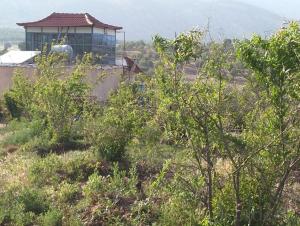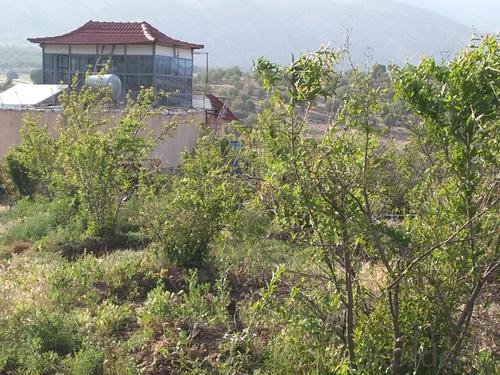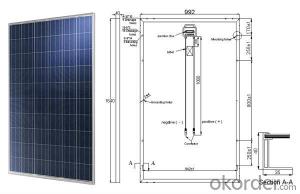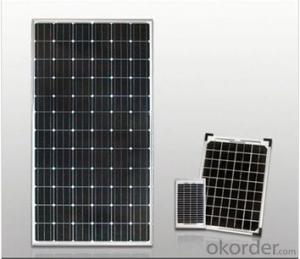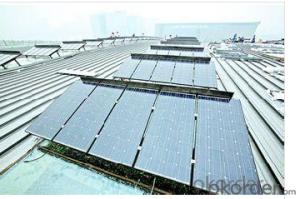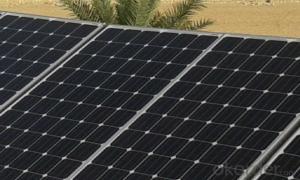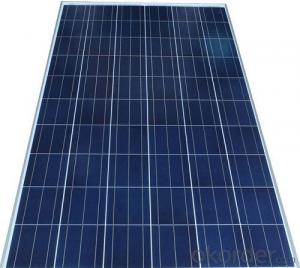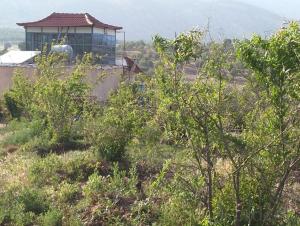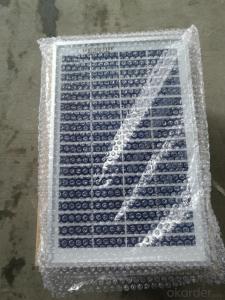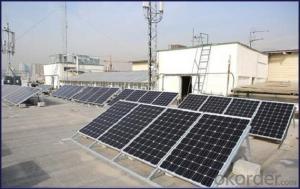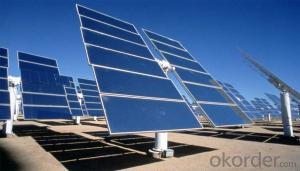CE and TUV Approved High Efficiency 50W Mono Solar Panel with Solar Panels Lightning Protection
- Loading Port:
- Shanghai
- Payment Terms:
- TT OR LC
- Min Order Qty:
- 10000 watt
- Supply Capability:
- 20000000 watt/month
OKorder Service Pledge
OKorder Financial Service
You Might Also Like
Specification
Product Description:
1.Structure of Polycrystalline Silicon Solar Panel
I. High efficiency crystalline silicon solar cell. Even if under the weak light, the solar module can produce maximum power output.
II. Tempered glass (toughened glass): Anti-reflecting coating and high transmission rate glass increase the power output and mechanical strength of solar module.
III. EVA and TPT: Using high quality EVA and TPT to prevent destroying and water.
IV. AI frame: Without screw, rner connection. 6 holes on the frame can be installed easily.
V. Junction box: Multi function junction box with water proof.
VI. Long lifetime: ≥25 years; Less power decrease.
VII. Good performance of preventing from atrocious weather such as wind and hails.
VIII. Resisting moisture and etching effectively, not effected by geology.
IX. The certificate issued by international authority: UL, TUV, IEC, CE.
2.Characteristics
1)Manufactured according to international quality and Environment Management
System (ISO9001, ISO14001)
2)High efficiency crystalline silicon solar cells
3)High transmission Iow iron tempered glass, strong mechanical resistance
4)Anti-ageing EVA and excellent anti-climate back sheet
5)Anodized aluminum frame improves load resistance capabilities for heavy wind loads.
6)Standard waterproof junction box
7)High endurance to different weather
8)Good and friendly package with less transportation and storage space.
3.Warranty
1)10 years limited manufacturing warranty
2)10 years for 90% of warranted minimum power
3)25 years for 80% of warranted minimum power
4.The Pictures of Solar Panels
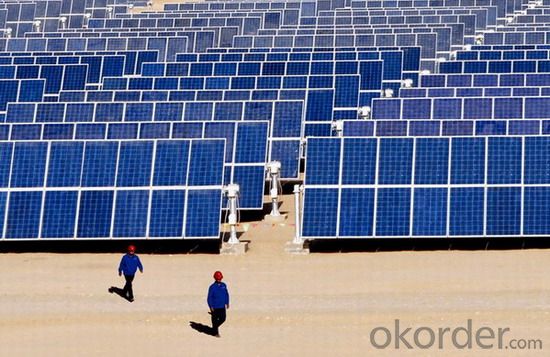
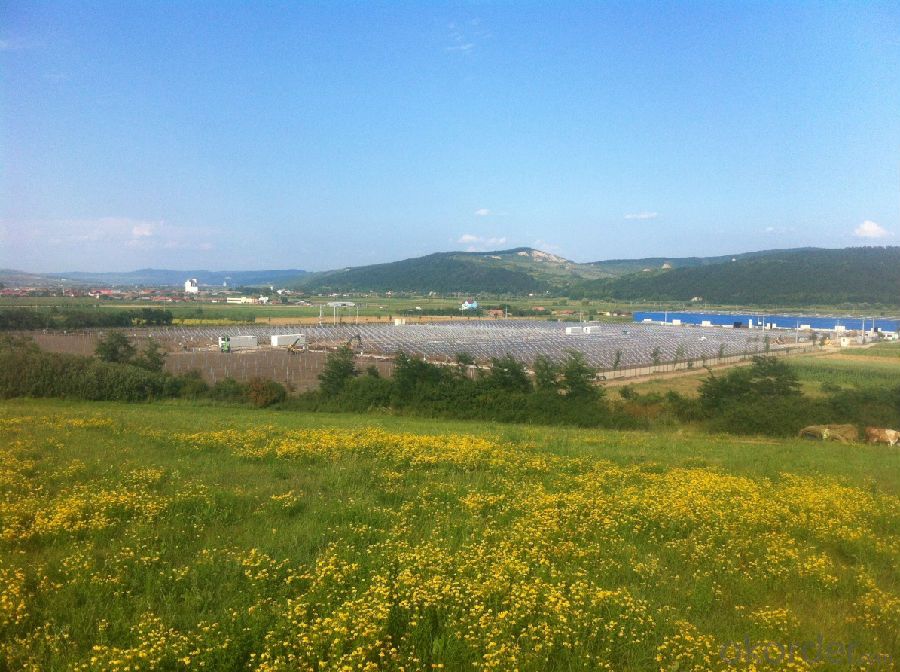
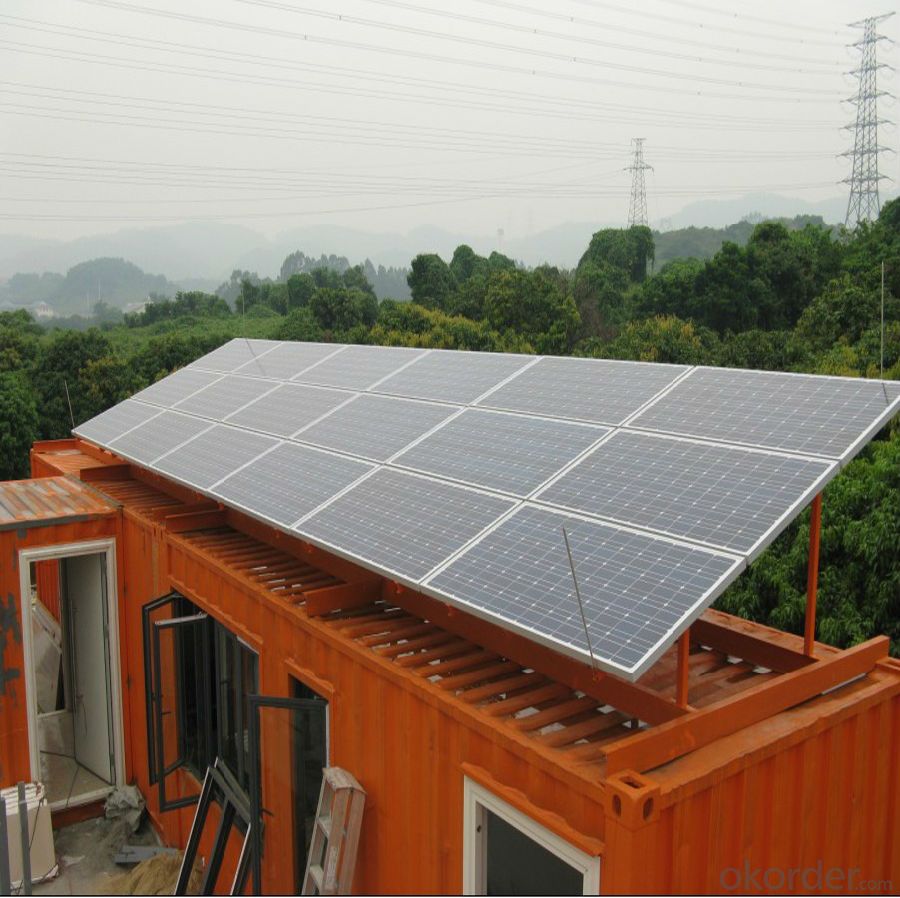
5. Production Flow
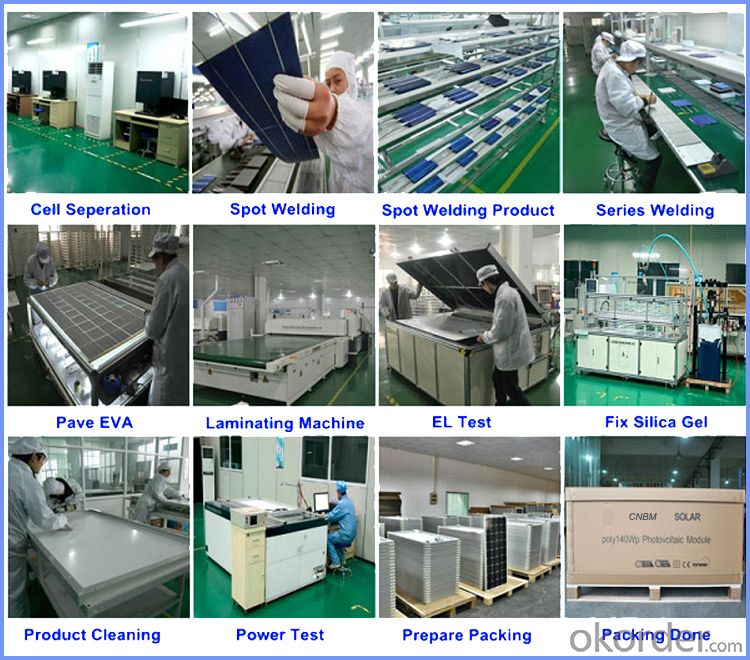
6. Packing Details
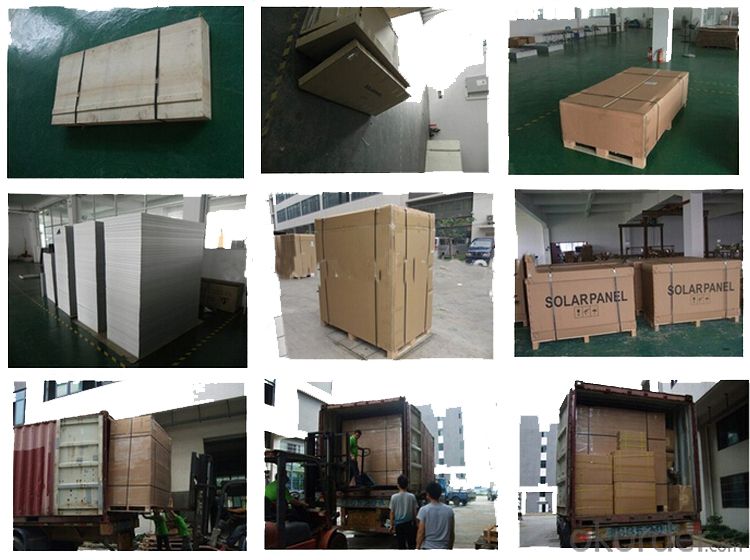
7. Use For
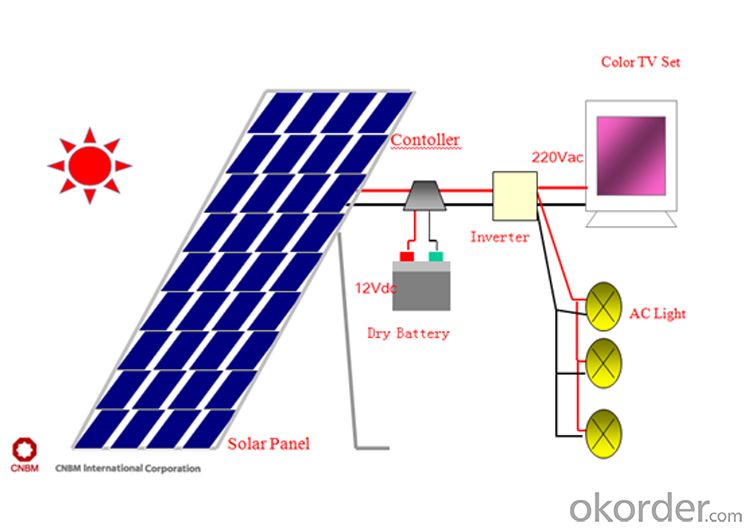
- Q: Can solar panels be used in areas with high levels of rainfall?
- Yes, solar panels can be used in areas with high levels of rainfall. While excessive water exposure can affect the performance of solar panels in the short term, modern solar panels are designed to withstand different weather conditions, including rain. Proper installation and maintenance can ensure their efficiency and longevity, even in areas with high rainfall.
- Q: When you get solar panels do you connect them to the grid?
- Not directly and it also depend on where you live. If where you live has net metering then they would be indirectly connected to the grid, there is equipment involved besides just the panels on the roof.
- Q: I need help?!!
- It needs some battery banks in order to store the energy that will be useful during nighttime if less energy is stored in the batteries due to poor weather condition the effectivity of it is minimized. It has some limitations like you need more batteries in parralell to store more energy from solar cells, and it needs to be fully recharge the next day after it is discharged at night.
- Q: Solar panels single crystal and double crystal in the rain which is easy to use
- At present, monocrystalline silicon solar cell photoelectric conversion efficiency of about 15%, the highest reached 24%, which is all types of solar cells in the photoelectric conversion efficiency of the highest, but the production cost is so large that it can not be a large number of extensive And commonly used. Since monocrystalline silicon is typically coated with tempered glass and waterproof resin, it is rugged and durable for up to 15 years and up to 25 years.
- Q: i need technical and non technical details to generate MW power by solar panels
- First off, you should consider cost per kilowatt-hour (kWh) since kWh is energy whereas MW is power, and kWh is a common unit of energy used by power utilities. But first you would need to design the power capacity required, which as you state, is assumed to be MW. Average system costs = $95 per square foot Average solar panel output = 0.6 watts per square foot Average solar energy system costs = $8.95 per watt Form this information, the capital cost of installing MW = $8.95 /W * 0^6 W/MW = $9 million. The lifetime of a typical solar power system is probably about 20 years. Assuming a true MW peak output of the solar panel it would be anticipated that a daily average energy production would be peak output over about 3 hours per day, or 3 MWh of energy per day. Total production over a 20 year system life would be 3 MWh * 365 days/yr * 20 yr = 22 x 0^3 MWh So in terms of costs of capitalization of the system, the cost of Energy (/kWh) = $8.95 million / 22 x 0^3 MWh = $0.40 / kWh (approximately) This cost does not include maintenance, however, given the simplicity of these systems; other than periodic equipment replacement, which is covered by specifying a 20 year complete system replacement; other maintenance cost should be relatively low. The required surface area of solar panel = 0^6 W / 0.6 W/ft^2 = 94,340 ft^2 or a little over 2 acres of panel surface area. To be able to properly access and maintain the solar array, the minimum area required would likely be 5 to 0 acres.
- Q: What is the typical warranty period for solar panels?
- The typical warranty period for solar panels is around 25 years.
- Q: Can solar panels be used to power a space station?
- Yes, solar panels can be used to power a space station. In fact, many space stations, including the International Space Station (ISS), utilize solar panels as their primary source of electrical power. These panels convert sunlight into electricity, providing a sustainable and renewable energy source for the space station's various systems and experiments.
- Q: The intensity of sunlight at the distance of the Earth's orbit is 380 W/m2. An Earth-orbiting satellite has a solar panel that measures .35 m by 4.86 m, which converts solar energy to electrical energy with an efficiency of 26%. In one hour, how much electrical energy does the panel produce? Assume that the satellite's attitude control jets keep the panel oriented perpendicular to the incoming sunlight.
- This is pretty much an exercise in knowing units and dimensional analysis. Watts are in Joules/second. So every second a square with the area(meters^2) of meter^2 receives 380 joules from the sun. In your case the square is the solar panel. So find the area of the solar panel in m^2. If you multiply area times intensity you can see that the meters cancel out and you are left with Watts(J/s). Since you want the Joules received in an hour you again multiply by how many seconds are in an hour. Leaving you with joules. What you have now is the total energy, but your solar panel is only 26% efficient, so just multiply by .26 and you will have your energy.
- Q: So, assuming that a solar panel is flush with the ground (i.e. only the photovoltaic side is visible, the other sides are covered by dirt,) what would happen if it was run over by a car? How about an SUV? Would it break?Would the solar panel still generate electricity?
- Solar panels have tempered glass, and are tougher than they seem. On commercial buildings where the panels are flat, they have a person with a mop regularly clean them, and that person walks right on the panels. A car might crack the glass, but that could be solved by simply using stronger glass. The problem of putting a panel right in the roadway would mainly be that the cars passing over it shadow the panel constantly. On a rooftop installation, installers try to avoid even a tiny shadow from a vent pipe or overhead wire, as this has a larger effect than might be supposed. Also, road grime would quickly accumulate on the panel and reduce its efficiency. Glass would be slippery as a road surface, but that problem could be solved. Metal is slippery, too, but they make bridges out of it. EDIT: To clarify, I meant serious solar panels in the first paragraph. The hobby type that they sell at Radio Shack or Harbor Freight are fragile.
- Q: name things someone could use solar panels for or make with solar panels? (use solar energy i mean?)
- Solar panels can bee installed into your houses or apartments power box (if it's outside). But Solar panels cost more than $00 so i hope you saved up.
Send your message to us
CE and TUV Approved High Efficiency 50W Mono Solar Panel with Solar Panels Lightning Protection
- Loading Port:
- Shanghai
- Payment Terms:
- TT OR LC
- Min Order Qty:
- 10000 watt
- Supply Capability:
- 20000000 watt/month
OKorder Service Pledge
OKorder Financial Service
Similar products
Hot products
Hot Searches
Related keywords
